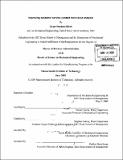Improving customer service contact root-cause analysis
Author(s)
Elliott, Grant Stephen
DownloadFull printable version (11.03Mb)
Other Contributors
Leaders for Manufacturing Program.
Advisor
Sanjay Sarma and Stephen C. Graves.
Terms of use
Metadata
Show full item recordAbstract
When a customer calls or e-mails customer service, a customer service agent will diagnose the issue, render a solution, and then wrap-up the call or e-mail. For many customer service departments, this wrap-up process requires the agent to classify the reason the customer contacted customer service. Typically, this classification is done by assigning a code that describes the reason for a contact. Additionally, if a contact requires a concession, the agent will classify the reason the customer requires a concession, and select an appropriate code. These codes are used by the various business teams within the company to identify and correct failures in their processes. Therefore, these codes should drive down to the root cause for a contact or concession to allow for efficient correction. Possessing codes that do not clearly identify the root cause for a contact are of little or no use for the company. Additionally, the codes must be developed in such a way that they can be accurately chosen by either the agent or the customer. Having agents select the wrong code not only obscures the true cause for a contact, but also creates additional work due to the process involved in determining the correct code. This thesis looks at the challenges inherent in developing a list of codes that both provides clear insight into the root cause for customer contacts, and can be accurately selected by the customer service agent or the customer.
Description
Thesis (M.B.A.)--Massachusetts Institute of Technology, Sloan School of Management; and, (S.M.)--Massachusetts Institute of Technology, Dept. of Mechanical Engineering; in conjunction with the Leaders for Manufacturing Program at MIT, 2009. Includes bibliographical references (p. 50).
Date issued
2009Department
Leaders for Manufacturing Program at MIT; Massachusetts Institute of Technology. Department of Mechanical Engineering; Sloan School of ManagementPublisher
Massachusetts Institute of Technology
Keywords
Sloan School of Management., Mechanical Engineering., Leaders for Manufacturing Program.